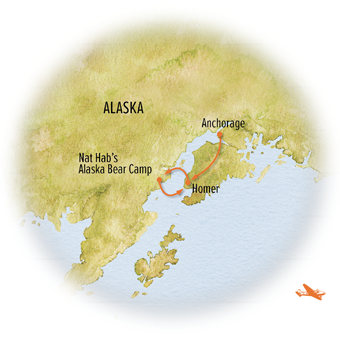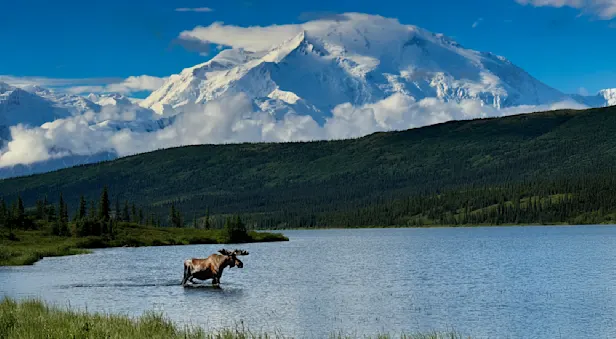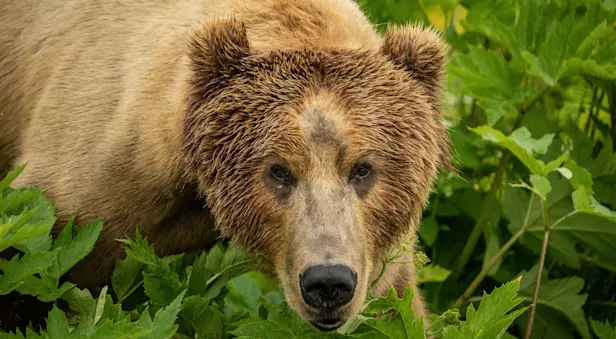Itinerary
At the Anchorage airport, board our chartered group flight to Homer, where our Alaska Bear Camp adventure begins. This scenic fishing town of 5,500 on Kachemak Bay is located near the bottom of the Kenai Peninsula. Known as “the end of the road,” Homer is the most southerly point on Alaska’s contiguous highway system. Surrounded by 280 acres of protected state land, this critical wildlife habitat sustains more than 100 bird species and a large local moose population. Homer’s key geographic feature is the Homer Spit, a 4.5-mile-long gravel bar that extends into the bay. Visitors to the town harbor frequently see fishing boats unloading their catch—Homer is heralded as the Halibut Capital of the World. This evening, gather with our Expedition Leader for a welcome dinner and orientation to the incredible bear adventures that lie ahead.
Head out on a private boat cruise this morning to explore the abundant waters and magnificent scenery of Kachemak Bay. The bay is transformed daily by some of the largest tidal fluctuations in the world, and it's home not only to coveted sport fish but other plentiful marine life, too, with sea otters, seals, and sea lions being common sightings. A highlight of our cruise is the Gull Island seabird rookery, home to 10,000 nesting seabirds with a chance to view puffins, guillemots, kittiwakes, murres and more.
After lunch we fly by private chartered bush plane across Cook Inlet to Nat Hab’s Alaska Bear Camp. Weather in this region is often fickle and unpredictable, so we are prepared to work with our pilot to determine the best window of opportunity and adapt our timing as needed. Once we’re in the air, the view is staggering as we pass snow-clad volcanoes and jagged glaciers winding down from icefields on high. Our destination, where the Aleutian and Alaska ranges meet, is Lake Clark National Park, some of the world's most critical brown bear habitat. Look for bears along the shoreline as we come in for a landing, taxiing down the beach. Bear Camp is located on a historic homestead, a rare private inholding of coastal land surrounded by the roadless wilderness of Lake Clark National Park and Preserve. These 4 million protected acres are the ancestral homelands of the Dena'ina people, preserving an intact ecosystem at the headwaters of the largest sockeye salmon fishery in the world. Accessible only by plane or boat, Bear Camp is ours alone for an unparalleled immersion in pristine brown bear habitat.
Once we reach Bear Camp, we gather for an orientation and safety talk with coaching on bear etiquette, before heading out with our naturalist Expedition Leaders to meet the bears! Here at Bear Camp, we have some of the best, most consistent viewing anywhere in Alaska, due to the season-long availability of food. In the spring, sedge grass awaits the bears as they emerge from their dens, protein-rich food that supports rapid growth. Bears also dig clams from the beach as they await their late summer feast: by late July or early August, the region's salmon runs help provide the fat that enables the bears to survive a long winter. All season long, nature serves a steady bounty to these omnivores. And since the bears are sated by this abundance, they see us humans merely as part of the scenery, allowing us to move safely in their midst on guided outings, at times observing them from just a few yards away. Two viewing platforms, one elevated for a territorial view, enable us to see bears nearby and at a distance. And we often watch them right from camp, which is surrounded by electrified wires, ensuring our safety on site. After an exhilarating day, settle into your weatherproof tent cabin before we gather in the dining tent for dinner—you'll be surprised at the outstanding meals our resident chef is able to prepare in such a remote location. Fresh local fare is on the menu, including Alaskan salmon and other offerings from the region’s seasonal abundance.
Prior to this rare opportunity, most of us will have seen bears only in zoos or nature documentaries. Yet there's nothing that comes close to this immersive experience, being among them in their wild home. Against a backdrop of sheer-sided peaks rising above the green valley floor, the bears are sometimes near enough that we can hear them chewing their food and communicating with one another in woofs, purrs and growls. Alaska's mighty brown bears—the coastal version of the interior grizzly bear (which is the same species, Ursus arctos)—are the largest land predators in North America. Adult males can weigh up to 1,500 pounds!
While bear activity will vary according to the season, weather conditions, and timing of the salmon runs, and we can never predict exactly what bear behavior we'll witness, there's always something riveting going on. Earlier in the season, we might see mating activity. Later on, we could catch a sighting of mothers with playful cubs. Once the salmon start running by mid- to late summer, we may see bears fishing in streams. And while bears are usually plentiful right in the vicinity of camp, we also go into adjacent Lake Clark National Park for added variety. At every turn, we explore the area in the careful company of our Expedition Leaders, seasoned bear naturalists who offer thorough coaching in respectful "bear etiquette" to ensure your safety. Our low-impact presence ensures that we never disturb the bears, and they in turn grant us comfortable access to watch them go about their daily routines.
Enjoy one last morning to marvel at the bears in Lake Clark National Park, admiring their majesty and whimsy alike. Few travelers ever have such an encounter with solitude and wilderness on the scale that surrounds us here. The size of the landscape, the raw beauty, the profound silence—these things alone would make for a life-transforming experience. But the chance to watch Alaskan brown bears, these incomparable icons of the wild, on their turf, their terms...it's a wonder to have bears welcome us into their world. And one thing is certain: no one leaves here unmoved by the bears' plight, intensely aware of the threats from mining, climate change and other potential impacts to the health of this vital ecosystem on which the bears rely. We depart as ambassadors for the bears, our time among them leaving an indelible mark on us, inspiring us to do all we can to protect them.
If the weather cooperates, we plan to depart Bear Camp for Homer after lunch. Boarding our bush plane, we taxi down the beach, looking for a last glimpse of bears on the shoreline as we go. Back in Homer, we transfer to our hotel at the very end of the Homer Spit, edging the beach with broad views of Kachemak Bay and the Kenai Mountains beyond. There may be time to wander around the spit, lined with shops and galleries featuring Alaskan art and handicrafts. Later this evening, celebrate our adventures at a farewell dinner.
Our Bear Camp adventure comes to a close today as we transfer to the airport for homeward flights.
Pair This Trip with Another Nat Hab Journey
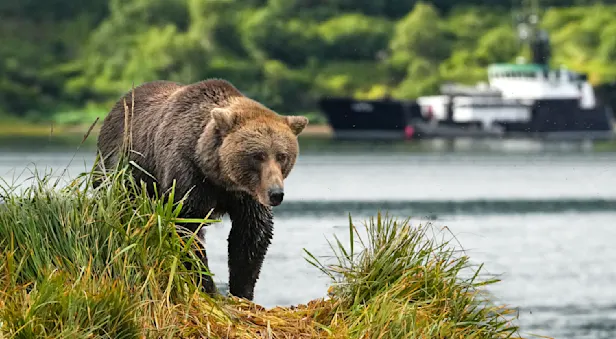
Alaska's Grizzly Ship: Kodiak to Katmai
An exclusive small-ship adventure to view giant brown bears—the world's largest "coastal grizzlies"—up close! Walk the shores as bears dig for clams, forage for sedges and pursue salmon in season in tidal streams.

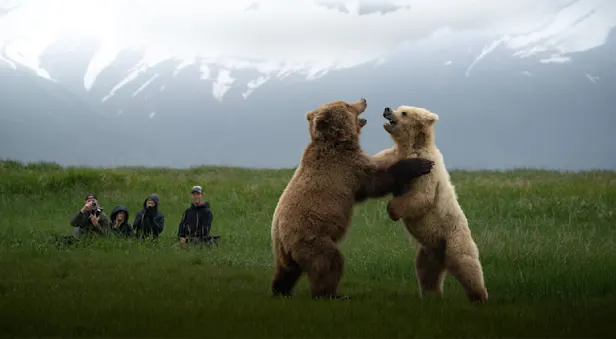
Grizzly Ship Photo Expedition: Kodiak to Katmai
Based aboard our private small ship, just eight guests photograph brown bears in the roadless Katmai wilderness, going ashore with an expert bear naturalist and photography pro who knows these animals intimately.




















